Review of Sony Ericsson K660i – Old Ideas Get New Form
With the K610i appeared on the market the company manifested its desire to use the same platform in both middle-priced and top devices. Is this strategy profitable nowadays?Table of contents:
- Design
- A200
- Phone book
- Messages
- Organizer
- Multimedia Menu
- Music
- Connectivity
- Games, applications
- Camera
- Phone quality
- Conclusion
The main merit of the K610i inherited from the K800i/K790i is platform A100, which can boast about very important advantage – it has no program limitations on the number of started Java-midlets. It is this point that distinguishes the device from the W810i, which has the same price tag, but much better camera. The program borrowed from the main flagship-devices and affordable price gave the K610i the trump card in comparison with its rivals.
Almost one year and the half have passed since the K610i was launched, but Sony Ericsson delayed the announcement of the successor. It filled the market with devices that had higher class or the handsets with the same specifications differing only in design and worse screen. Fortunately, the delay, caused by the intention to equip the successor with new program platform A200 (the same as in the K850i, the W910i) hasn’t been too long.
November 5th 2007 saw the official presentation of the K610i’s successor, which has got numerous novelties, as the QVGA-screen and aforementioned program platform A200.
Design


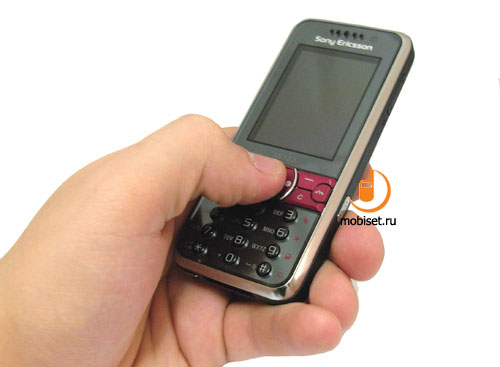
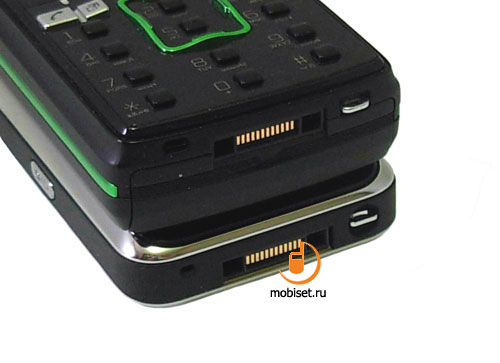
The bar handset measures 103.7 x 47 x 14.6mm and is 95g in weight. With these dimensions it is rather pocket-friendly device. The phone lies comfortably in the hand and gives feelings as if you hold a solid small plastic brick. The casing is firmly built, without squeaks and creaks, the same as in the K850i and much better than in the K850i. The casing is made of firm glossy plastic, which we failed to cave near the screen. The chamfered edging is made of chromized chafe-resistible plastic. We’ve got a sample in Wine on Black colour scheme to test. At the same time there is also available another colour solution – Lime on White. Both solutions look pretty well and ruin the austere style of the K-series devices. Furthermore, the front panel in the Black scheme features not the blunt black colour, but utilizes the technological Liquid Metal.

Near the top end of the front fascia you see five round earpieces covered with fine grille, which has the same colour as the navigational pad of the keypad. To the right of the holes you find the CIF-camera lens used for video calling.

The latter is one centimeter higher than the 1.9inches TFT-screen with QVGA-resolution. The screen specifications copy the one in the T650i, except the brightness, which in this case is tuned up at 10-15%. The screen is embedded rather deeply in the casing, thus it is protected from damages, though the viewing angles are reduced to 140 degrees. There are also some problems with the screen when at the sunlight.

The navigational pad of the keypad has the same style as in the K530i, except the flattened navi key with the silver OK button in the center, which has rough facing. Instead of the usual dedicated Internet and Active Menu keys, the ends of the navigational pad house the call send and end buttons, which in this way prove the presence of new platform A200. Thanks to the outward chamfered edging, the buttons are very handy in use in spite of small size. The silver edging of the navi key helps greatly to handle it, while the borders on the top and bottom end of the button exclude the unintentional pressings on the OK key instead of the vertical declines.
The numerical keypad consists of round buttons with the numbers only on them. The letters are placed to the left of the keys; the last row on the right has the explanatory icons of the shortcut functions used in the Net Front browser.
The keys have an average tough travel distance and distinct clear click. The glossy surface of buttons and edging badly affects both usability and ergonomics, as the fingers get wet after several minutes of typing or gaming.
The sides of the casing are equipped with a dead rubber Soft Touch. This insert makes the phone more stable in the hand. The trick to make the insert narrower in the top gives unique features to the simple design idea.


The right side of the casing houses a flat volume rocker key. Being so small, you can feel it only with “bare” hand, but when in gloves, for example, you have to find it blindly. Thanks to the sufficient width and short travel distance, it is handy to use in most situations. On the same level with the navigational pad you see the dedicated camera/shutter release button. It also features a short travel distance, while the glossy surface let you easily find it, though it doesn’t stand out from the casing.


The left side of the handset has unremovable plug of the M2 memory card slot. It has a handy cut to be picked up with a nail, so you are unlikely to have any problems with it.
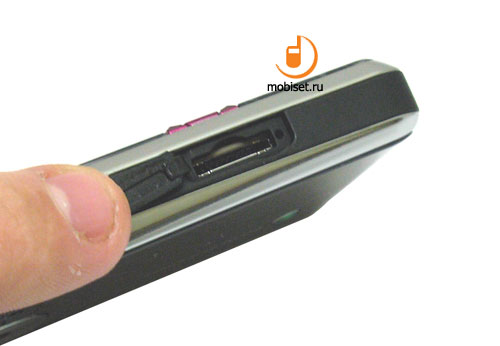
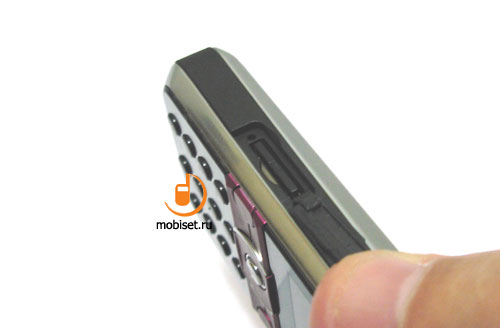
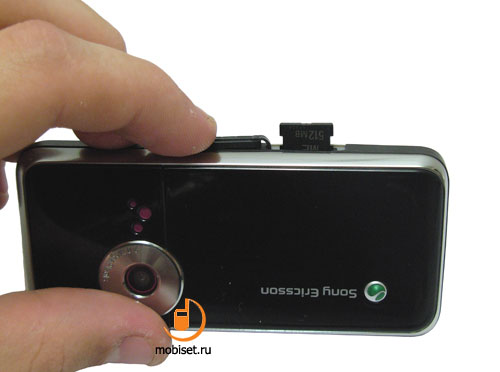
After you open the plug, you’d better pull down till the stop. After that you can easily either pull in or out the memory card. It is a minor trifle, but there are no signs, that you have to insert the memory card with the contacts looking at the keypad, but not vice versa. Nevertheless, these moments are described in the manual several times.
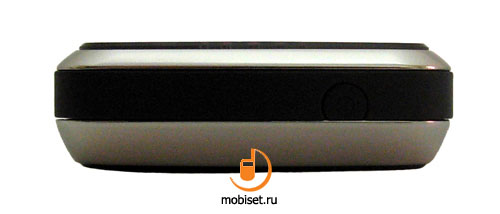
The top end houses the power button slightly embedded in the casing.
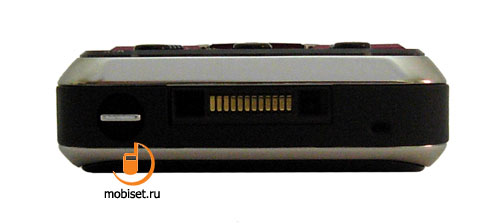
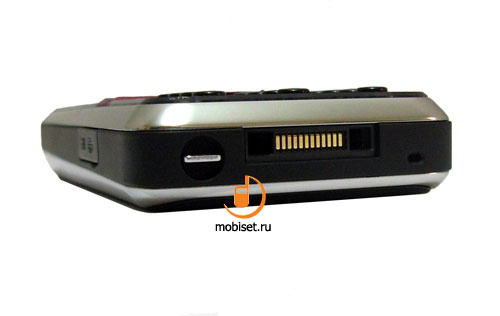
As you’ve already understood, the Fast Port locates on the bottom end. Near it you find a stripe hole similar to those in the K790i and the K850i. The place to the right of the Port is occupied by the microphone pinhole.
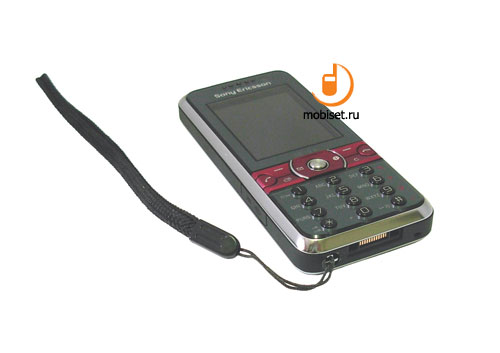
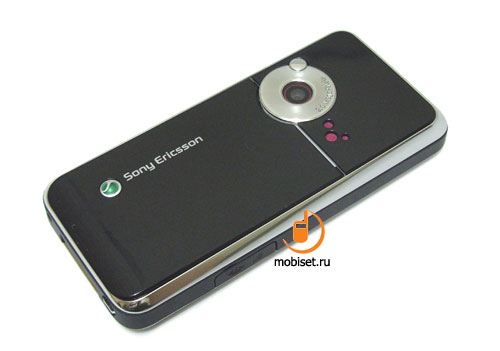
The rear surface of the handset is made of almost glossy black plastic. In order to make it more eye-catching the manufacturer added to the black colour some silver shiny specks. But you can notice them only after you diligently remove finger prints from the surface. Under the middle of the rear fascia you find a line showing the place where the battery cover and the other surface join. As usual, the even joint is interfered by the big round silver band with the 2magapixel camera in the center. Close to the left side you find a tiny self-portrait mirror. To the right of the camera the vendor located 3 holes of different sizes of the polyphonic loudspeaker, which is covered with the fine pink grille.
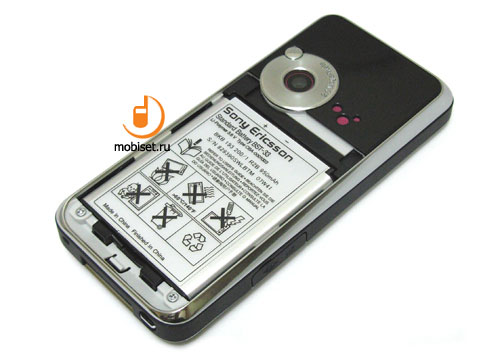
To remove the glossy battery cover you should just pull it a bit down and then put in any side. Under the cover you find the BST-33 Lithium Ion battery capable to run for three day with the mediocre use.
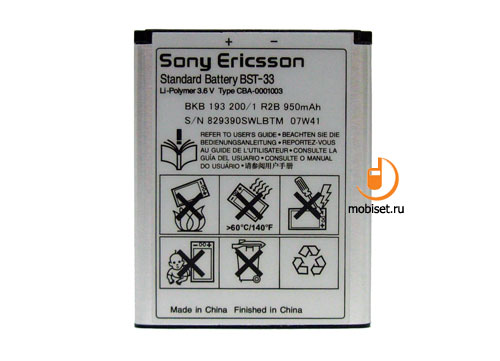
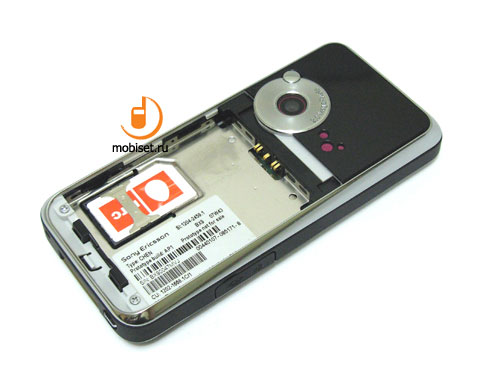
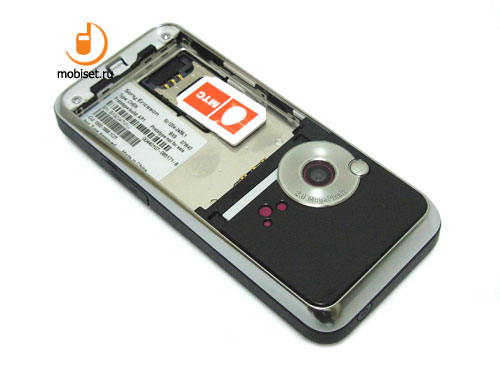
The battery can be easily pulled out thanks to the big uncovered part bellow. After removing it, we find the common sim card slot. It is fixed with the help of the immovable frame, in which the card is pulled in. Due to the inclined sides of the hollow, you need just a second to pulled the sim card out.
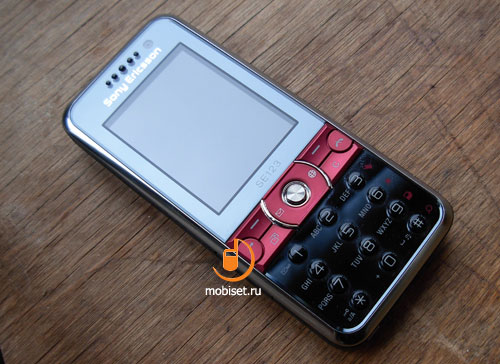
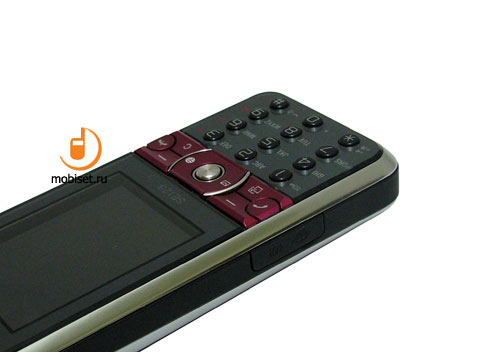
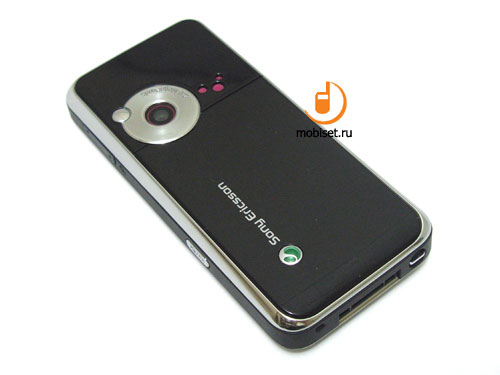
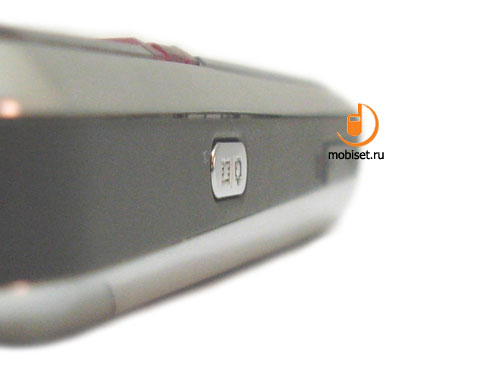
A200
First and foremost, we’d like to answer all questions about the comparison of the new program platform and the previous one. We made up our mind to review the program shell from the very beginning that will be the right thing in this case.
In the stand-by mode the corners of the top part of the screen houses the traditional 5-degree signal strength indicator and battery indicator. They frame a field for different system indicators, from missed events and active Bluetooth to silent alert mode. The indicator of the started Java application was changed into the one reminding the symbol of Active Menu.


Below on the screen you can find the operator name and system information. The bottom part of the screen shows date, digital clock and timer counting, if it is any started. The first thing attracting your attention is a bold used in the titles of soft-keys. It becomes as small as the date indicator. The changes are caused by the improvements in the phone control system. This is a second, after A100, friendly step of Sony Ericsson towards the more compatible content, developed to the Nokia S40-series phones. Now in the bottom of the screen you see signs both to the soft-keys and affirmation button. But unfortunately, it has no effect on the possibility to appoint the soft-keys. The latter are still bound with the certain functions. The left key opens the Multimedia Gallery, the right one – phone book. The joystick has now broader capabilities – it can start the Java midlet. Active Menu remains unchangeable, so it is worth no repeat.




The available call send and end buttons partially affected the ergonomics. From one hand, they made the soft-keys free from a function to send call, thus raised the ergonomics in the phone book. The end button allows to forget about long pressing the back button, that we used to move into the stand-by mode. From the other hand, here the phone has a drawback, which was partially improved in the Walkman-solutions featuring the dedicated player button. The thing is that, the call end button turns off the player during the playback. Is it handy, it isn’t.
To enter the main menu you press now the central affirmative key. The menu consists of 12 items, which are demonstrated in the style depending on the set of the preinstalled icons. The main menu lacks now the File Manager. It was done in order to stimulate a user to try the main novelty of the A200. This function is likely to be fixed after the joystick decline by many fans of Sony Ericsson. As it used to be, there is a digital navigation through the main menu, as well as in most submenus.



Among the minor improvements we can mention the better animation of the floating windows, as well as not very pleasant message notification, which displays both message type and sender. CallerID is implemented in the same way: the half of the screen displays either image or video clip assigned to the contact.
The profiles are still limited by 7 add-ins, which can be changed in terms of the following parameters:
- Ring volume
- Increasing ring
- Vibrating alert
- Key sound
- Divert calls
- Accept calls
- The way to receive a call (certain key or any key except the call end button).
6 profiles may change the names, but the images remain unchangeable.






The support to the Flash-animation in the themes becomes a customary thing in all A200-baesd phones of the company.



Phone book
In terms of the quick search we can mention the correct search by first name and second name, as well as by all phone numbers. As usual, the search is made by the correspondence to the entered name or first numbers of a phone. For example, if you are looking for a number 8 999 000 65 01, the phone shows it after you start entering 8 … in the search field. We’d like to remind you, that Windows Mobile provides search from any place, and the abovementioned phone number is shown, if you enter, for example, 65. The same is with names and second names.







The phone memory saves up to 1000 entries and 7000 phone numbers. Each contact may include the following information:
- mobile, personal mobile, work mobile, home, work and other numbers. In the same section you are enabled to add fax number.
- name
- Web address
- ringtone and picture
- title
- company
- street
- city
- region
- postal code
- country, where the work is.
- the same address information for the residence
- note with up to 511 symbols
- birthday.





The list of calls is very simple. When selecting a number, you see date and time of the call. The calls can be sorted into received, send, missed calls, as well be shown in bulk.



Messages
The handset comes with a handy application to create SMS/MMS. As usual, you are enabled to view the emoticons as pictures. The maximal size of the text message amounts to 1188 symbols.



The MMS application remains unchangeable. It has eye-catching interface to create compound messages up to 300Kb. You are enabled to attach audio files, pictures, video clips. The necessary apps to create attachment may be opened right from this menu (camera, voice recorder).





The email client allows to adjust a new account through five steps. Firstly, you enter your name and email address. Then follows login and password, after that the phone suggests your receiving the other settings from the server Sony Ericsson.com/support. If there is no access to the Internet, the last two steps are as follows: choose the connection type (POP3, IMAP4) and enter incoming and outgoing servers.








The changes of the interface include only the new background of the reading/writing windows of messages.







All attachments can be saved in the phone memory – that is very handy.
Organizer
Let’s look through the Organizer apps.

The first one is a functional alarm clock allowing to create up to five alarms. To each of them you can adjust time, recurrent. The phone also makes it possible to choose alarm signal or radio. It is pleasant that you can rename the alarm (for example, to name it “it’s time to dine” instead of “alarm 03”), as well as fix an alarm picture. (If we are talking about dinner, there is a plate with soup).




Calendar
There are two ways of viewing: monthly or weekly with each day having an hourly schedule. After choosing the necessary weekday, you can quickly create a reminder. The latter has lots of settings. They are as follows: subject, start time, duration, reminder (5-30 minutes before), recurrence (daily, weekly, monthly, early), location. To cap it all, you are enabled to add small description of the event. As you see, the reminder is not the perfect one, but it is rather good taking into account, that it isn’t the separate organizer, but just a function of the mobile phone.







Notes
Here you can create common notes 254 symbols long.


Timer
It is a common timer. You fix a time to within a second, and see the count in the stand-by mode.

Stopwatch creates up to 9 laps.



Calculator is noticeable for the possibility to extract root.


The presence of the code memo is very intrigue. In the rest, the 4-digit password symbolizes only, that these notes are very important.



Multimedia Menu
The design of the interface almost copies the menu of Sony PlayStation Portable. The vertical shifts have a nice animation; to the right of an item you see semitransparent floating balls. To chose a necessary item you can use either the affirmative button or decline the navy key to the right. The main menu consists of five items; each of them we’ll discuss separately. They are as follows: photo, music, video, stream-TV and settings.
Settings
In this item you adjust the screen orientation.



Video
This menu item includes all supported video clips, both made with the camera and others. The window to choose a clip has a vertical list capable to display five clips labeled with thumbnails. The latter are static; when cycling through them, the phone has some jerks.


The clips can be viewed with a rate amounting to 30 frames per second. The player has an option to scale a picture when in the landscape mode. After you switch on this orientation the first 3 seconds the screen displays the semitransparent signs of the context keys and duration scale. Then they disappear.

Photo
The main novelty of an application is a photo viewer. It can sorts out the stills by latest photo, photo and other pictures. When opening the latest photo, you view photos in the viewer. The camera album has a monthly sorting. The collection section saves all images added to the folder “favorite”. The last item shows all pictures stored in the folder “Pictures”.





Let’s enter the camera album. Each month has a thumbnail changing each 5 seconds. We choose the month we need and go to the table of photos, which have this date in EXIF. When looking through the thumbnails below, in the mode of three columns, we see both photos done in the chosen month and the other photos marked with another title. In this viewing mode you can choose the marked image as a wallpaper, contact image, screensaver or greeting. When you choose a thumbnail, the latter is growing smoothly on 20% and in the same smooth way it shrinks, when you choosing the next image. When you press the Option key, a picture smoothly occupies the whole screen. After pressing Back, the image smoothly goes on its place in the table without covering the next pictures. It is an eye-catching moving, though you may get tired of it after a couple of weeks.





After we’ve chosen a picture, we go into the viewer. There in the first 3 seconds we see semitransparent signs and symbols of the declines adjusted to the navi key. The context menu of functions lists all standard options of the picture viewer. There as follows: send via Bluetooth, print, PhotoDJ editing and slide presentation.







The latter can also be started after pressing the Play button. When we press it, 5 ways of playing appears:
- Silent
- Sad
- Romantic
- Happy
- Energy.
As the vendor intended, this emotional way of displaying photos is the most suitable one to the slide-show. The name of this system of presentation is X-Pict Story. Each of the “moods” has its type of melody and special type of cycling through the pictures.







In many cases the effects resemble the comedy detectives of 70th shot in the southern states of the USA. To describe the smooth and nice-looking movements of pictures is dull, so we’d rather try to compare from memory our guest with Nokia N76.
| Criteria | N76 | K660i |
| Styles of passing | no | Yes |
| Melodies in the background | Yes | Yes |
| Choose your melody as a background | Yes | No |
| Time of displaying an image | Yes | No |
It is a short table. It turns out, that the styles of passing are the only advantage of the A200 over the Nokia multimedia smartphones.
Music
Hurray! Walkman 3.0 is available since now on all phone regardless the presence of the Walkman sub-brand. Of course, the second version of the player was well elaborated and functional in comparison with its rivals, but the competitive vendors have already introduced some new interesting player versions during the last year. The most successful was Nokia, that updated the interface of the music focused smartphones since the N81, and furthermore, S40 5th Edition can boast about rather eye-catching player interface.






The main difference of the third version of the player is that it is integrated in the multimedia menu and the list of sorting is almost copies the other lists in this program. The same as in the second version, to cycle through the library, that is leisurely refreshed each time when you insert the memory card, doesn’t necessarily need to use the OK button. It is enough just to decline the key to the right in order to choose and to the left – to go back. The icons of the sorting times have been moved in the left column and became vertical ones. The context menu, that is called up by the left soft-key, hasn’t been changed.
The playing window consists now from the thin progress bar occupying the whole width of the window. The bar has above a small window of Album Art, icons of playing back modes and the current position of the track in the playlist. There is also an information line on the top, where you see the indicators of the signal strength, battery, notifications and time.
Under the line the screen displays the played time and the rest time, ID3-tag and symbols of the navigational key. It is interesting that the navi key itself is equipped with these symbols. When pressing up and down, you call up the current playlist occupying the half of the active window. After changing the orientation in the landscape one, the symbols of the navi key move to the right sight of the scrolling bar.


The settings feature a common visualization instead of the album cover, shuffle and repeat settings. The equalizer has 5 lines. The other remains unchangeable.











The sound quality hasn’t changed in comparison with other phones of the company. The same concerns the maximum loudness. It is enough only for the ear-buds-like type of headphones.

The phone also houses a FM-radio supporting an automatic search for the channels and RDS info stations. All active channels can be saved in the 20 memory cells.




Connectivity
The phone comes with Bluetooth 2.0+EDR module running at 100-120 KB/s. The device provides steady connectivity either when transferring bulky files or with a wireless headset.
To connect the K660i to PC via cable is the simplest task. There is nothing new in it; the safety cutting off by means of Windows utility is another drawback inherent in Fast Port.
Games, applications
The phone comes with three preinstalled games.

Rollercoaster Rush 3D. It is a nice bright game comparable with numerous Play man Summer Games and so on. There is a train on the roller coaster, there are fastidious passengers. There is button 6 to accelerate, and 4 button to brake. All that you need to keep the passengers’ adrenalin scale full up to the top during the whole way. The more the average scale index is, the more points you get. The game is a bit slow sometimes, but it still remains acceptable.





Quadra Pop. It resembles both Tetris and Diamond Mines. You need to compound a figure from 4 elements (fish, crab or medusa), then it disappears and you get 20 point for each element on you score.



JC Does TEXAS. It is a simple game resembling games from the series “throw a penguin”. But this time instead of a penguin we have a cowboy, who is shot from the gun. The cowboy has to make as much different things in the air as he can. He can collect linen, get power from lightning, hitchhike with eagle, ram at planes and other objects, which bring the points. The game is simple and captivating, though we’d like to play in the vertical mode also.





The application contains common Face Warp and Accuweather.




Performance
JBenchmark1: 8336
Text: 2885
2d shapes: 1979
3d shapes: 952
Fill rate: 818
Animation: 1702
Jbenchmark 2: 1262
Image manipulation: 350
Text: 704
Sprites: 664
3d transform: 730
User interface: 26646
JBenchmark 3d
JBenchmark 3d hq: 468
JBenchmark 3d lq: 455
Triangles pear second: 37736
Ktexels pear second: 1556
JBenchmark hd
Smooth triangles: 36891
textured triangles: 32448
fill rate: 1400 ktexels
gaming: 169 (5,6 frames per second)
Camera
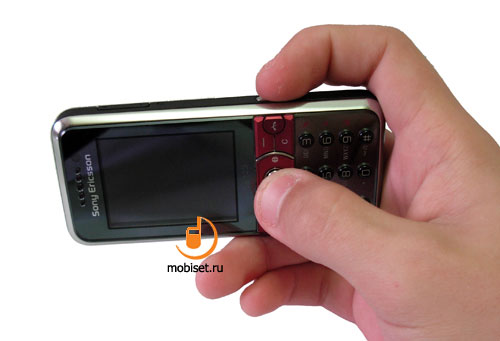
The phone is equipped with a 2megapixel camera without autofocus. The camera interface copies the one in the photo focused flagship model K850i. The exception is the number of items in the menu and cycling through modes (photo, video, viewer), which can be assign to the declines of the navi key.


The camera settings are as follows:
- Shoot mode
- Resolution
- Night mode
- Self-timer
- White balance
- Effects






The other available settings include picture quality, review, memory type, shutter sound that can be off and reset counter.



In the video mode you are enabled to adjust clip length, white balance, colour effects and use useless night mode, self-timer, mike and choose the memory time.
It is up to you, how you assess the picture with the inappropriate white balance, but we’d like to say a couple of words about the video shooting.













Since now the clips have the long-lusted QVGA resolution. To be the happiest user, you need to choose the 30f/s frame rate, but alas! This specification lays in store for the flagship model only, the other handsets have to be contented with 15f/s. Though it doesn’t affect the quality: there are noises, hangs up in some parts of the clip. In general, the clips can be comparable with those, recorded with smartphones Nokia 6120, 6110, 6290. For the device from the middle segment, the result is not bad, but even the old lady 6233 does much better.
You can compare video clips done with the K660i and K850i.
K660i Video Sample, mp4, 1.3 MB >>>
K850i Video Sample, mp4, 1.0 MB >>>
Phone quality
The connection quality is the same as in other devices of the vendor. The earpiece is loud enough to be heard in most situations, though when in quiet room, you can tune the loudness down. The polyphonic loudspeaker copies the one in the W610i and T650i. The vibration alert is mediocre, but the most users are likely to find it sufficient.
Conclusion
The K610i has a rather logical successor considering the whole range of devices of the company. First of all the phone design unites the features both the K810i and the flagship handset K850i. Our guest has a new platform, quality screen, good keypad, 3G/EDGE support, as well as nice price tag (about 250 euro at the start of sales, with the following reduction to 200 euro). Among the drawbacks of the handset we can name only the easily soiled casing. The 2megapixel camera without autofocus doesn’t look like a shortcoming, as we remember the useless 3.2 megapixel module in the W890i as well as the purposeless autofocus in the K770i.
We can recommend this phone to those, who don’t need the multi-pixel cameras, but like its design. So in March 250 euro will be enough to purchase the most reliable phone running A200 with good performance of the Java-machine with the Jp-8 library, player with the Mega Bass function, Fast Port jack in the bottom end. Here you can also find a nice clip slide program and record video clips with 320x240 resolution and many other interesting functions of A200.
The tested sample has R1DA028 firmware with camera software version 1.7.
© Written by Tikhonov Valeriy, Mobiset.ru
Translated by Arina Urban.
Published — 08 April 2008.